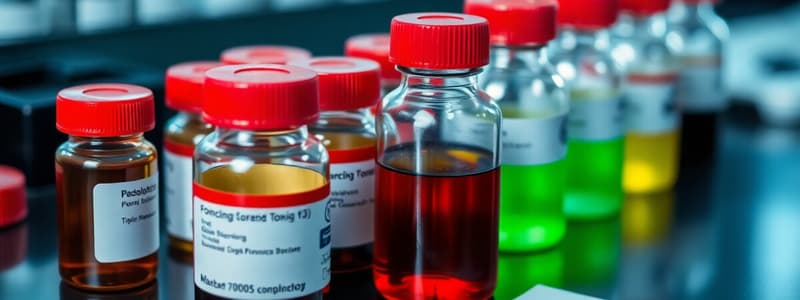Podcast
Questions and Answers
In a forensic toxicology investigation, what is the primary reason for meticulously documenting the chain of custody?
In a forensic toxicology investigation, what is the primary reason for meticulously documenting the chain of custody?
- To ensure the admissibility of evidence in court by demonstrating its integrity and accountability. (correct)
- To allow multiple unauthorized personnel to access the sample for independent analysis.
- To minimize the cost associated with sample handling and storage.
- To expedite the testing process and reduce lab turnaround time.
Which security measure is MOST critical in a forensic specimen collection area to prevent sample tampering and maintain the integrity of the evidence?
Which security measure is MOST critical in a forensic specimen collection area to prevent sample tampering and maintain the integrity of the evidence?
- Restricting access to authorized personnel only and controlling access to water sources. (correct)
- Permitting personal items, such as mobile phones, in the collection area.
- Allowing unobserved exits and entrances for personnel convenience.
- Using collection supplies from various sources to minimize costs.
A forensic scientist is analyzing a sample suspected to contain multiple illicit substances. Which analytical approach would provide the MOST comprehensive initial screening?
A forensic scientist is analyzing a sample suspected to contain multiple illicit substances. Which analytical approach would provide the MOST comprehensive initial screening?
- Relying on visual inspection of the sample for any visible contaminants.
- Performing individual spot tests for each suspected substance separately.
- Using a broad-spectrum technique like Gas Chromatography-Mass Spectrometry (GC-MS) to identify various compounds. (correct)
- Conducting a single immunoassay test targeting the most commonly abused substance only.
In a workplace drug testing program, what additional training do healthcare workers at the testing labs typically receive, beyond standard forensic sample handling?
In a workplace drug testing program, what additional training do healthcare workers at the testing labs typically receive, beyond standard forensic sample handling?
When collecting a urine sample for forensic toxicology, what is the MOST important consideration to prevent potential adulteration or substitution?
When collecting a urine sample for forensic toxicology, what is the MOST important consideration to prevent potential adulteration or substitution?
A forensic toxicologist is called to assist in a case where a victim is suspected to have been poisoned with a rare toxin. What is the initial step the toxicologist should take?
A forensic toxicologist is called to assist in a case where a victim is suspected to have been poisoned with a rare toxin. What is the initial step the toxicologist should take?
In the context of forensic toxicology, what is the primary purpose of using a tamper-evident seal on a specimen container?
In the context of forensic toxicology, what is the primary purpose of using a tamper-evident seal on a specimen container?
During the investigation of a crime scene, a forensic team discovers a collection of vials labeled with chemical names, but without any chain of custody documentation. What immediate action should be taken?
During the investigation of a crime scene, a forensic team discovers a collection of vials labeled with chemical names, but without any chain of custody documentation. What immediate action should be taken?
Flashcards
Toxicology
Toxicology
The scientific study of poisons, including their detection, effects on the body, and treatment.
Chain of Custody
Chain of Custody
The documented process of maintaining control and accountability of a specimen from collection to final disposition.
Chain of Custody Form
Chain of Custody Form
A form that documents every individual who handles a forensic sample, ensuring accountability.
Tamper-Evident Container
Tamper-Evident Container
A container designed to show evidence of tampering if opened, ensuring sample integrity.
Signup and view all the flashcards
Restricted Access
Restricted Access
Restricting access to only authorized personnel to maintain the integrity of forensic samples.
Signup and view all the flashcards
Controlled Supplies
Controlled Supplies
To keep only essential collection supplies in the collection area.
Signup and view all the flashcards
Controlled Water Access
Controlled Water Access
Controlling access to water sources in the collection area to prevent sample adulteration.
Signup and view all the flashcards
Alcohol Breath Test
Alcohol Breath Test
A test that measures the amount of alcohol present in a person's breath.
Signup and view all the flashcardsStudy Notes
- Course is NB 3172 Special Technique: Handling of Forensic Specimen, Toxicology & Special Cases
Toxicology
- Scientific study of poisons encompasses detection methods, effects on the human body, and treatments.
- Extensive training, experience, and supervision are essential for sample collection.
- Samples can come from diverse sources, for instance rape kits or crime scenes.
- Samples may undergo exposure to external elements such as weather or environmental factors.
- Trace samples like single hairs or minute drops of blood are key.
- Accurate results are critical in varying environments.
Chain of Custody
- Defined as the structured method for maintaining control and accountability of a specimen from collection to final disposition.
- This process is followed for reasons, like forensic sample collection, handling, and testing and workplace drug testing.
- The identity of every individual handling the sample must be documented.
- A chain of custody form must be completed.
- Specimens should be placed in permanently sealed, tamper-evident containers.
- Every individual who handles every aliquot must sign a form
- Healthcare workers in labs providing workplace drug testing require additional specific training.
Drug Testing
- Drug testing can be required for medical check-ups, sports, or legal issues.
- Substances tested for include cannabis, amphetamine, morphine, steroids, and alcohol.
Security Measures
- Access restricted to authorized personnel only.
- Only necessary collection supplies allowed in the collection area.
- Unobserved exits and entrances are prohibited.
- Secure handling and storage procedures for samples.
- Controlled access to water in the collection area.
Specimen Collection
- Types of specimens include urine, alcohol breath tests, and blood alcohol level.
- Blood Alcohol Unit (BAU)
Studying That Suits You
Use AI to generate personalized quizzes and flashcards to suit your learning preferences.



